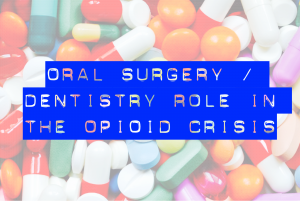 A recent report on CBS This Morning, “Wisdom Teeth Removal is Contributing to the Opioid Crisis, Experts Warn,” clearly got my attention. After all, I am an oral surgeon, and wisdom teeth extraction is one of my most commonly performed procedures. And yes, I do believe dentistry did contribute, in part, to this epidemic.
A recent report on CBS This Morning, “Wisdom Teeth Removal is Contributing to the Opioid Crisis, Experts Warn,” clearly got my attention. After all, I am an oral surgeon, and wisdom teeth extraction is one of my most commonly performed procedures. And yes, I do believe dentistry did contribute, in part, to this epidemic.
In early 1990’s during my oral surgery residency, we spent a lot of time learning about surgical procedures, techniques, materials, and medical management of patients needing oral and maxillofacial surgery. We learned how to manage various medical conditions and how to administer anesthesia. We were taught how to perform intricate surgical procedures as well as how to manage related complications. We also learned how to manage patients post-operatively, including surgical site management, nausea/vomiting, swelling, and pain— all collectively part of procedures and protocols we simply followed. Prescribing antibiotics and analgesics, like Vicodin and Percocet, were routine and given to patients following surgeries without much thought. And this wasn’t just for oral surgery but also for general surgery, trauma, plastic surgery, and other disciplines throughout our rotations.
So, for many years in private practice, I followed the same post-operative pain management protocol we were taught. It wasn’t until early 2010 that I first heard about the opioid epidemic. Later, in 2013, when more reports emerged about the increasing number of deaths related to Fentanyl, I became aware of the growing problems. We also saw reports of Vicodin and Percocet becoming common street drugs. So, I began to take a closer look at our prescribing practices with regard to opioids.
First, I started an awareness campaign providing information on various pain management options and risks associated with opioids. I advised patients and parents regarding the “responsible” use of opioids (see our Opioids Awareness Disclosure). My team and I encouraged the use of non-steroidal anti-inflammatory drugs (NSAIDs) and only prescribed more potent analgesics when necessary. Additionally, we asked more questions about each patient’s pain threshold, their previous experiences, and what has been effective for them. Finally, we differentiated pain medication needs based on the type of surgery being performed so we were able to recommend patient-specific regimens.
Here is our current protocol:
We discuss three basic options for the management of post-oral surgery pain:
- Option #1: Non-steroidal anti-inflammatory drugs (NSAIDs). This the non-narcotic over-the-counter option using Ibuprofen and Acetaminophen. This option is adequate for most teeth extractions, biopsies, dental implant surgery, and most dental-related pain. The recommended regimen is 600 mg of Ibuprofen (3 Advil) along with 500 mg of acetaminophen (Tylenol) taken TOGETHER every 4-6 hours. You may also add 100 mg of Caffeine twice daily for added relief. This combination is a very effective regimen providing excellent pain relief without any opioids.
- Option #2: Low potency combination drugs such as Tylenol #3 (acetaminophen + codeine). This is an alternative option although not necessarily with more pain relief. It may be added in between the dosages described in option #1. But you must be cautious not exceed the daily recommended dosage of Acetominophen (3200 mg). Tylenol #3 can be taken every 4-6 hours as needed.
- Option #3: High potency combination drugs such as Vicodin or Percocet. This may be indicated in highly invasive surgical procedures, for those with existing infection, and for individuals with a low pain threshold. However, even in this group of patients, the NSAID regimen described in option #1 may be adequate. Vicodin or Percocet dosage is 1 tablet every 4-6 hours as needed for pain. Such medications are prescribed in very limited number and for short-term therapy (1-2 days maximum) along with thorough information on its responsible use.
We provide two types of approaches to pain management:
- Ease-Up: Start conservatively with non-narcotic medications and elevate only if necessary. Patients are instructed to use only the non-steroidal anti-inflammatory drugs (option #1) as described above. If patient is experiencing inadequate pain relief, then add low potency combination drugs such as Tylenol #3 as described in option #2. In rare cases, where option #1 or #2 are inadequate and patient is experiencing severe pain, no more than 6 to 8 tablets of Vicodin or Percocet can be prescribed.
- Benefits of Ease-Up approach: Most patients will rarely have to use any types of narcotics with adequate pain relief using option #1.
- Potential pitfall: If NSAIDs are not adequate, patient will experience pain through a grace period until the added opioids take effect.
- Ease-Down: Start with 1-2 days of high potency combination drugs as described in option #3 and then taper down to NSAIDs as soon as possible.
- Benefits of Ease-Down approach: Controlled pain management during immediate post-operative period with transition to non-narcotics as soon as possible.
- Potential pitfall: Exposure to opioids; should be used cautiously with total awareness and responsibility.
With increased awareness of opioids risk, patients often request a conservative approach to pain management. Many parents prefer avoiding opioids for their child’s wisdom teeth extractions, even if it means slight discomfort post-operatively. With better communication, conscientious use of opioids if absolutely necessary, and patient-specific pain management strategies, we hope to make an impact toward the effective and safer pain management of our patients.
Dr. H. Ryan Kazemi is a board-certified oral and maxillofacial surgeon in Bethesda, MD